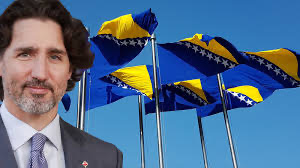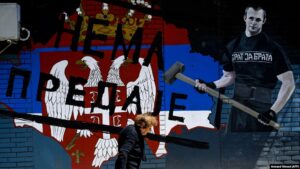Compassion unearthed
Suzana Vukic is the Member of the International Expert Team of the Institute for Research of Genocide, Canada
Sometimes I find myself pleasantly surprised with a letter from a reader. Recently, Hudson resident Britta Nessensohn wrote to me. Born in Switzerland (where she lived until the age of 24), Britta met her husband while travelling and followed him to Canada, and Hudson, years ago. In her letter, Britta mentions that she reads my column regularly:
“I am not related by blood to any place or people that you write about, but I find it very important that people know what has been happening in the [Bosnian] Genocide. It is so easy and comfortable to just shut our eyes and ears to any injustice going on outside our comfortable world here. We are really blessed to live in peace, have food and shelter and not to have to live in fear, pain and war,” explains Britta.
“I find it very important that you write about the genocide and all the positive and constructive things that are born out of this horro” she continues. “I just wanted to express my gratitude to you that you express and live the passion and the courage to speak your mind and the truth about this painful and horrifying act that has been done. At the same time it reminds me that there are other places in the world where this has happened as well and people shut their eyes, ears and mouths about it. Not only do you reveal the truth about the former Yugoslavia, you reveal at the same time other truths that have been happening around the world…[…]…You are doing something very important, meaningful and educational,” says Britta.
These words speak volumes. This space is invaluable to me; it’s where I discuss and offer my opinion on important topics. Because of my connection to the Balkans and the former Yugoslavia, it would be unthinkable for me not to write about the Bosnian war and its aftermath. It’s important to bear witness.
It’s not always easy to determine whether or not readers understand what I’m trying to say, especially in discussing the Bosnian war. It’s a very complex subject. With her letter, Britta was able to demonstrate that she “gets it”. Although not connected to that region, she’s able to understand and feel compassion for victims of war.
Bosnia is considered to be old news. Every now and then, events will bring the Bosnian war to the forefront of current world events. For example, this year Bosnians and the world commemorate the 20th anniversary of the beginning of the war. But once it loses its flavour of the month appeal, it’s easy for the world to forget about this place, as well as the suffering that continues.
I’ve recently been in touch with my friend and colleague, Bakira Hasecic, President of the Sarajevo-based association Women Victims of War – dedicated to victims of wartime rape. She described to me the events in her hometown, Visegrad, on Saturday, May 26, when they had a collective funeral and burial for the remains of 66 of the town’s Bosniak residents – all murdered in 1992 by Bosnian Serb forces as they ethnically cleansed the town. These were all people that Bakira knew – friends, relatives, neighbours – including her niece and nephew – Alma, then 10, and her brother Nermin, not quite 15 at the time. Three days later, Bakira buried the remains of a sister-in-law – also killed during the war. Bakira and many others have yet to uncover the remains of all of their missing and murdered family members. Bakira describes the pain as overwhelming, even after 20 years. The sight of the coffins makes everything real and final.
I’d like to thank Britta for her compassion and understanding, as well as for taking the time to write me a letter. I look forward to writing future columns dedicated to my upcoming trip to Bosnia.
**For readers who would like to donate to Women Victims of War, here is the information needed to make a wire transfer (done through online banking on the “international remittance” option): Women Victims of War, Attention: Bakira Hasecic, Address: Trg Oteskog Bataljona 64, Sarajevo 71000, Canton of Sarajevo, Bosnia and Herzegovina; payments go to the Vakufska Banka D.D. Sarajevo, Address: M. Titova 13, Sarajevo 71000, Bosnia and Herzegovina. This bank’s SWIFT-BIC code is: VAKUBA22. The International Bank Account Number (IBAN) for the association’s book project is: BA391601020000004728. To discuss further options on how to donate, please contact me:
suzana.vukic28@gmail.com
Suzana Vukic
Columnist
The Hudson/St.Lazare Gazette
www.hudsongazette.com


